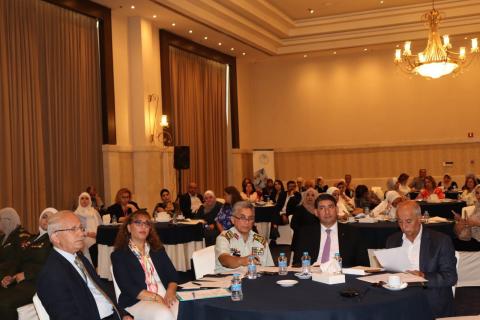

The Higher Population Council launched the national plan for the years (2021-2030) to implement Jordan's commitments towards the Nairobi Summit 2019 - ICPD +25 / accelerating the promise, with the participation of the relevant national authorities.
The document, prepared by the council with the support of UNFPA/ Jordan office and a participatory approach with the relevant national authorities, includes the conceptual framework adopted for the development of the document, which includes Jordan's international commitments, including the outcomes of the Beijing conference, the outcomes of the World Population Conference, the Global Agenda for Sustainable Development, the current situation of the Jordanian population and the dialogues held with stakeholders, as well as other strategies issued in this regard.
The secretary-general of the Higher Population Council, Prof. Dr. Issa Al-Masarwah, confirmed that the national plan comprehensively reviewed the situation of the population in Jordan, and indicated the demographic, social and economic conditions, with a focus on reproductive and sexual health topics in all its elements and components. The document referred to the rapid increase in the population as well as the challenges faced by the Jordanian society in the field of sexual and reproductive health, supported all this with figures and statistics issued by the concerned institutions in the kingdom.
Al-masarouh pointed out that the national plan outlined the national commitments towards the Nairobi 2019 summit, of twelve, and the current Jordanian situation was clarified under each commitment to justify the goal of changing this situation in order to reach a determination of how to change this situation, through the proposal of major interventions that varied in nature from policy to awareness and education, to the development of laws and regulations, to services and financial capacity-building and research, followed by a list of activities to be carried out to implement the proposed interventions, indicators, monitoring and evaluation mechanism and the bodies responsible for the implementation of the proposed activities.
For her part, the head of the population and Development Program at the United Nations Population Fund, Layali Abu-Seer, confirmed that the Nairobi summit came to set a clear direction on how to move forward and go forward to achieve justice for all women and girls, indicating that our march is still continuing, and it's time to achieve tangible results for women and girls, ensuring that no one is left behind and achieving the Sustainable Development Goals. She pointed out that in Jordan we are working with national partners to develop plans and programs to achieve the national commitments that we have pledged to follow up and implement.
The director of programs at the Higher Population Council, Dr. Sawsan Al-Dajah, said that the plan emphasizes Jordan's commitment to the ICPD program of action and the priorities of the Sustainable Development Goals, Jordan's continued commitment to providing information, advice and quality family planning services based on the human rights approach, especially for remote areas and vulnerable groups, and providing reproductive planning methods through the Ministry of Health and distributing them to all concerned parties, raising the rate of using modern methods from 37.4% in 2018 to 43.3% in 2025, and Jordan's commitment to strive to achieve zero maternal mortality and morbidity, which can prevention of them and such maternal diseases as obstetric fistula, confirm Jordan's commitment to ensuring that adolescents and young people have access to comprehensive and age-appropriate information through the implementation of national standards for youth-friendly sexual and reproductive health services, ending sexual and gender-based violence including a commitment to zero child and forced marriage.
The plan also confirmed on meeting the needs of local communities, increasing the percentage of official development assistance allocated to ensure universal access to sexual and reproductive health, and Jordan's continuation of implementing national policies, strategies and plans to reach the demographic opportunity stage, seeking to provide supportive social insurance, seeking to achieve universal health insurance by 2030, providing funding opportunities for entrepreneurial projects to reduce unemployment, raise the enrollment rate in vocational education, encourage and provide financial and technical support for self-employment projects and business incubators, strengthening the link between education and the labor market, empowering women and ensuring their access to Comprehensive and equitable rights, especially enhancing their economic participation by providing a supportive environment for them.
In addition, Jordan committed to implementing the provisions of the law on the rights of persons with disabilities 2017 and the social protection strategy (2019-2025), which respond to the needs of vulnerable groups of people with disabilities, the elderly, the poor and refugees, and Jordan continues to strengthen national statistical systems, build national capacities, provide national and local (subnational) and gender-sensitive data, strengthen institutional mechanisms through the implementation of the national strategy for Statistics (2018-2022), strengthen monitoring and evaluation systems to monitor national programs and plans, including executive development programs and indicators of the Sustainable Development Goals, issue periodic national reports on progress, as well as Jordan's commitment at the highest levels to continue the participation of young people in the development of national strategies and plans, and Jordan's commitment to implement the response plan to the Syrian crisis for the years (2020-2022).







